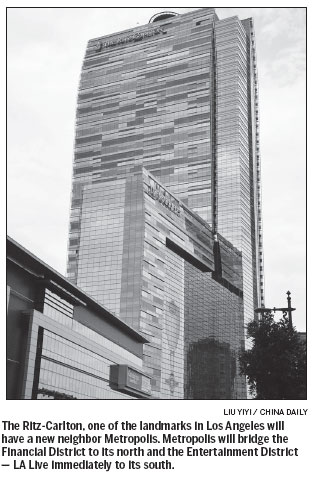Chinese investors put money where the market is - and not at home

Greenland Holdings Group's acquisition of a downtown Los Angeles site for a $1 billion hotel-office-residential project emphasizes how Chinese investors are putting their money where the market is - and it's not at home.
It's in the United States and elsewhere.
"We are extending the China market abroad, and we prioritize our investment to countries where Chinese immigrants, students and tourists like the most," Greenland Chairman Zhang Yuliang said Friday as the real-estate developer announced its acquisition of the 25,600 square-meter site from the California State Teachers' Retirement System, the second-biggest US pension fund.
The purchase price was not disclosed. The company expects to begin construction in six to nine months. On the day that the Los Angeles property purchase was announced, Greenland also said that its $480 million redevelopment project in Sydney that it announced in March has been approved by Chinese regulators and sales will start this year. Shanghai Greenland and Canada's Brookfield Asset Management bought two buildings for the redevelopment, which Shanghai Greenland said at the time was the biggest deal of its kind by a Chinese firm in Australia.
Greenland has become well-known back home in Shanghai as the builder of China's second-tallest tower - a 636 meter (125-story) tower in Wuhan, the capital of Hubei province, a project valued at 30 billion yuan ($4.8 billion) when announced in 2010.
But as China's leadership maintains residential-property curbs aimed at holding down skyrocketing prices, the company - and other Chinese developers - are moving their investments into the US and other overseas markets. Greenland said earlier this month it planned to spend 10 billion yuan on overseas property projects this year.
In February, China Vanke Co, the largest Chinese developer traded on the nation's stock exchanges, announced a $620 million luxury high-rise condominium project in San Francisco with its New York-based partner, Tishman Speyer Properties LP.
Xinyuan Real Estate entered the US market in October with a $54.2 million residential-land purchase in Brooklyn, New York.
The Los Angeles investment was the reward for California's hard push for Chinese investment - capped off by Governor Jerry Brown's China trade mission in April.
A 2012 report by the Rhodium consulting group showed that California is at the forefront of China's investment boom in the US. The Golden State attracted 156 deals from 2000 to 2011 - one-quarter of all Chinese investments in the US. Rhodium said California could potentially attract between $10 billion and $60 billion of Chinese direct investment by 2020.
But California is apparently is only part of a developing market for China.
Chinese investors seeking prime commercial property in the US moved to center stage in early June when a group led by real-estate tycoon Zhang Xin acquired a 40 percent stake in the most expensive building in the US - the General Motors office tower in midtown Manhattan.
The announced sale on June 2 was reminiscent of Japanese investors who bought iconic US commercial properties in the 1980s and 1990s, including New York's Rockefeller Center and the Pebble Beach golf resort in California.
Sonny Kalsi, founder of New York-based GreenOak Real Estate and former global co-head of Morgan Stanley's real-estate investing business, told China Daily at the time: "I already believe the flow of Chinese capital into US real estate will continue to increase and the meetings may lead to even more."
More than a month before Zhang's group completed its purchase of the minority stake in the GM building, executives with Chicago-based Jones Lang LaSalle had forecast that globally Chinese real-estate investment this year could reach $5 billion, paced by a billion-dollar first-quarter spending splurge on London office properties. The projected total would represent a 20 percent jump from 2012.
The global acquisition trend is expected to continue for the next 20 years, as China and the Asia-Pacific region chalk up more than $1 trillion in direct commercial real estate deals by 2030, Jones Lang LaSalle's De Haast told a Beijing real estate-investment forum in April.
By 2021, the Asia-Pacific region is expected to overtake the EMEA countries - Europe, the Middle East and Africa - in commercial real-estate growth.
Chinese investment growth has been especially strong in the five "super cities" of Hong Kong, New York, London, Singapore and Sydney, according to Jones Lang LaSalle. The first three cities have seen investments of almost $2 billion to $3 billion between 2003 and 2012, the firm said. David Green-Morgan, Jones Lang LaSalle's global capital-markets research director, told financial-news cable channel CNBC that Chinese individual investors are primarily interested in the industrial and hotel spaces in those cities, but a lot of demand is also coming from companies, he said.
"The Chinese government has a policy of globalizing Chinese companies, so we see a lot of demand from corporate who like to own their own buildings when they go overseas," Green-Morgan said. "They may rent some office space for a year or two and then look around for a building they can buy themselves."
Another reason for increased Chinese interest in commercial property is because "institutional investors and high net-worth individuals are able to transfer money out of China more easily now," Green-Morgan said. "That is a big hurdle taken out of the way".
On the books is a plan by Chinese development firm ABP Chinese (Holding) to build a Chinese and Asian financial and business center in eastern London's 130-year-old Royal Albert Dock area. ABP received approval on May 31 for the 1 billion pound ($1.51 billion) project, claimed to be the largest commercial real-estate undertaking involving Chinese investment in Britain.
In the US, the wave of Chinese real-estate spending is helping to revive a commercial real estate market that was damaged by the recession and slow economic recovery.
michaelbarris@chinadailyusa.com


















